
Objective_PET_for_Schools_Practice_Test_Booklet
.pdf
Test 1 Key
Five. How much will the girl spend on the swimsuit?
|
Girl |
1: |
Hi Louisa. You know Claire asked me to get her a new swimsuit? Well |
||||
|
|
|
which one should I get? I know she wears blue a lot but they've only |
||||
|
|
|
got one blue one in her size and it costs thirty-five pounds. There's a |
||||
|
|
|
purple one which is twenty-five pounds or a brown one which is only |
||||
|
|
|
twelve pounds. |
|
|||
|
Girl |
2: |
Mm, get the purple one, I think. It's not too expensive and it won't look |
||||
|
|
|
too |
cheap |
either. |
|
|
|
Girl |
1: |
OK. Brown's |
really boring and she's got a |
blue one already anyway, |
||
|
[pause] |
|
|
|
|
|
|
|
Now |
listen |
again. |
|
|
|
|
|
[repeat] |
|
|
|
|
|
|
|
[pause] |
|
|
|
|
|
|
Six. |
Which |
instrument can |
the |
children learn on Tuesday |
this week? |
||
Teacher: Listen carefully, children. There are some changes to music lessons for this week. The guitar teacher is unwell so there won't be any lessons with her on Tuesday. There will be violin lessons instead on that day. People learning the guitar will have an extra lesson on Tuesday next week. Piano lessons will be on Thursday as usual. So remember to bring your instruments on the right day.
[pause]
Now listen again.
[repeat]
[pause]
Seven. What did Stephen do yesterday evening?
Girl: |
What did you think of the football match on TV last night, Stephen? |
|||
Boy: |
Oh, my m u m wouldn't let me watch it because I hadn't finished my |
|||
|
homework. So I had to go to my room. But then friends kept texting |
|||
|
me, so I spent all evening on the phone. So I still haven't done it. |
|||
Girl: |
Oh, that's a shame. Because there's another match on tonight. You'll |
|||
|
miss |
that one |
too. |
|
Boy: |
I know, |
|
||
[pause] |
|
|
|
|
Now |
listen |
again. |
|
|
[repeat] |
|
|
|
|
[pause] |
|
|
|
|
That is the end of Part One. |
||||
[pause] |
|
|
|
|
Now |
turn |
to |
Part Two, |
questions eight to thirteen. |
61

Test 1 Key
Part 2 |
You |
will |
hear Anita Burroughs, an ice-skater, |
being |
interviewed about her work. |
|||||
For |
each |
question, choose the correct answer, |
A, |
B or |
C. |
|||||
You |
now |
have forty-five |
seconds to |
look at |
the |
questions for Part Two. |
||||
[pause] |
|
|
|
|
|
|
|
|
|
|
Now |
we |
are |
ready to |
start. |
Listen |
carefully. |
You |
will hear the recording twice. |
||
Interviewer: Today we |
have |
in the studio Anita |
Burroughs, who is a professional |
|||||||
|
|
|
ice-skater. Hi Anita. Thank you for coming. |
|||||||
Anita: |
|
It's great to be here. |
|
|
|
|
||||
Interviewer: So, Anita, have you always been interested in ice-skating? |
||||||||||
Anita: |
|
Since I was a very small child. I was lucky that my mother was |
||||||||
|
|
|
also a professional ice-skater and she was able to teach me, so we |
|||||||
|
|
|
didn't have to pay for a teacher. But sometimes I couldn't enter |
|||||||
|
|
|
competitions as we didn't have the money for the special clothes, |
|||||||
|
|
|
which cost a lot. There was an ice rink in a sports stadium that |
|||||||
|
|
|
wasn't far from where we lived, so we could be there in a few |
|||||||
|
|
|
minutes. That helped when I was practising before school. |
|||||||
Interviewer: You do shows on ice, don't you? |
|
|
||||||||
Anita: |
|
Yes, so I have to act as well as skate. Our tours last for ten months, |
||||||||
|
|
|
so I'm working all year except during the summer. We usually do |
|||||||
|
|
|
two or sometimes three shows every day but we do get two days |
|||||||
|
|
|
off every week, usually Sunday and Monday. |
|||||||
Interviewer: What's the hardest thing about the job? |
|
|||||||||
Anita: |
|
Lots of people miss their family |
but I don't have children yet and |
|||||||
|
|
|
I visit my mum and dad on my free days. I find the long practices |
|||||||
|
|
|
before a show really hard but when I'm performing on the ice, I no |
|||||||
|
|
|
longer feel tired. |
|
|
|
|
|||
Interviewer: You're quite well known now. How does that feel? |
||||||||||
Anita: |
|
It's good of course. I love being on the ice but I'm not so keen |
||||||||
|
|
|
on doing interviews. Because I'm nervous I always talk too much. |
|||||||
|
|
|
Radio interviews are easier than TV interviews as you don't have a |
|||||||
|
|
|
camera on you too. |
|
|
|
|
|||
Interviewer: Has ice-skating changed since you started? |
||||||||||
Anita: |
|
In some ways it's easier because the shows I do now are shorter. |
||||||||
|
|
|
But the audiences want it to be more and more exciting, so the |
|||||||
|
|
|
jumps are higher and involve lots of difficult turns. The tours are |
|||||||
|
|
|
longer too. That's what it's like for me here anyway. I don't know |
|||||||
|
|
|
about other |
countries. |
|
|
|
|
||
Interviewer: What are the most important skills for a successful ice-skater? |
||||||||||
Anita: |
|
Well, you have to be a very strong skater of course. You need to |
||||||||
|
|
|
notice what's happening around you as there might be thirty other |
|||||||
|
|
|
skaters on the ice with you, so you need to work together. And you |
|||||||
|
|
|
have to be able to laugh at yourself - you're often wearing a very |
|||||||
|
|
|
silly costume and occasionally you fall over. |
|||||||
Interviewer: Well, thank you very much, Anita, for talking to me. And now ... |
||||||||||
[pause] |
|
|
|
|
|
|
|
|
|
|
Now |
listen again. |
|
|
|
|
|
|
|
||
[repeat] |
|
|
|
|
|
|
|
|
|
|
[pause] |
|
|
|
|
|
|
|
|
|
|
That is the end of Part Two. |
|
|
|
|
|
|||||
[pause] |
|
|
|
|
|
|
|
|
|
|
Now |
turn |
to |
Part Three, |
questions |
fourteen |
to |
nineteen. |
|||
62
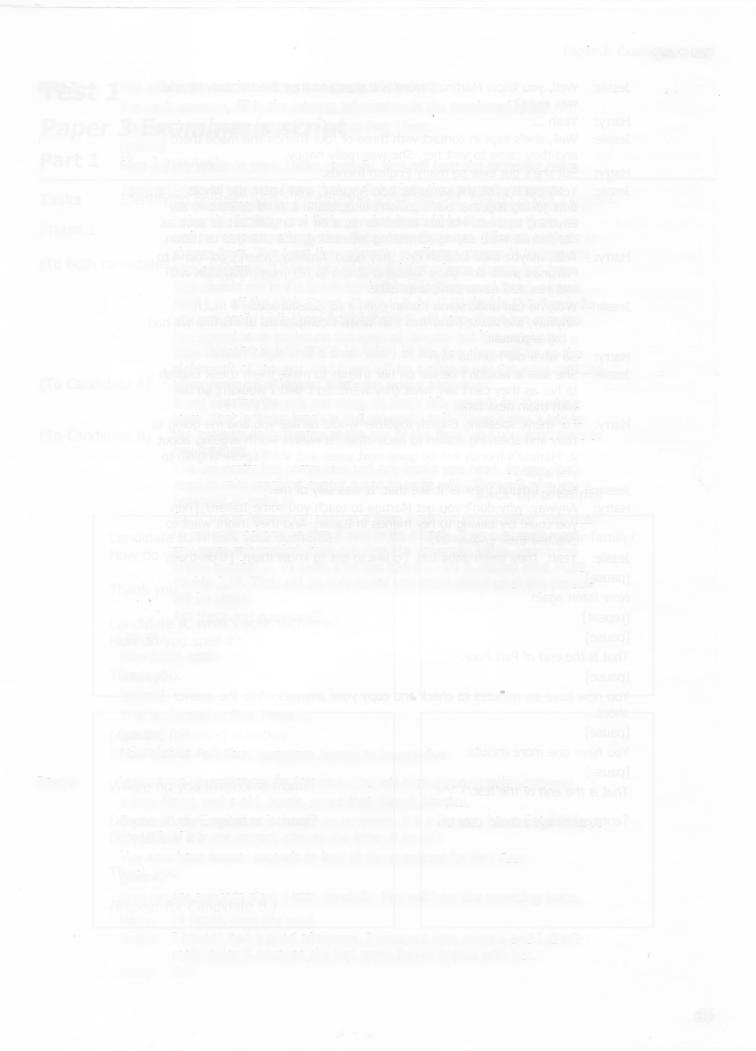
Test 1 Key
Part |
3 |
You |
will hear |
a |
teacher |
talking |
to |
a group of students. |
|
|
|
|
|||||||||||||
|
For |
each |
question, |
fill |
in |
the |
missing |
information |
in |
|
the |
numbered space. |
|
||||||||||||
|
You now have twenty seconds to look at Part Three. |
|
|
|
|
|
|||||||||||||||||||
|
[pause] |
|
|
|
|
|
|
|
|
|
|
|
|
|
|
|
|
|
|
|
|
|
|||
|
Now |
we |
are |
|
ready |
to |
start. |
Listen |
carefully. |
You will hear the recording twice. |
|||||||||||||||
|
Teacher: Some of you |
may |
know that on |
Saturdays the |
university arranges |
||||||||||||||||||||
|
|
|
|
|
some classes for local schoolchildren. It gives you a chance to use the |
||||||||||||||||||||
|
|
|
|
|
university facilities and find out what it would be like to go there, as |
||||||||||||||||||||
|
|
|
|
|
well as learn something new. Every term there are different subjects to |
||||||||||||||||||||
|
|
|
|
|
choose from. This term the university is offering classes in history and |
||||||||||||||||||||
|
|
|
|
|
also geography. I know lots of you did the science classes last term. |
||||||||||||||||||||
|
|
|
|
|
The classes are in the university building in Craigwood Road, a small |
||||||||||||||||||||
|
|
|
|
|
road just off the High Street. That's C-R-A-I-G-W-double O-D Road. So |
||||||||||||||||||||
|
|
|
|
|
you can easily walk there from school. It will take about ten minutes. |
||||||||||||||||||||
|
|
|
|
|
Our school term begins on the sixth of January but the university |
||||||||||||||||||||
|
|
|
|
|
term doesn't begin until a week later, so the first class will be on the |
||||||||||||||||||||
|
|
|
|
|
eighteenth of January. And there will be a class every Saturday until the |
||||||||||||||||||||
|
|
|
|
|
twenty-second of March. That's ten weeks altogether. |
|
|
||||||||||||||||||
|
|
|
|
|
It will cost five pounds per class, so that's fifty pounds for the whole |
||||||||||||||||||||
|
|
|
|
|
term. That includes lunch in the university café. There's also a trip to |
||||||||||||||||||||
|
|
|
|
|
the museum on a Sunday at the end of the term, and you don't have to |
||||||||||||||||||||
|
|
|
|
|
pay |
for that. |
|
|
|
|
|
|
|
|
|
|
|
|
|
|
|
|
|||
|
|
|
|
|
The university has computers and any books you need, so you don't |
||||||||||||||||||||
|
|
|
|
|
need to take anything except a pen to write with. They will give you a |
||||||||||||||||||||
|
|
|
|
|
notebook to write |
in. |
|
|
|
|
|
|
|
|
|
|
|
|
|
||||||
|
|
|
|
|
So, if you're interested, pick up a form |
from |
the school office. You need |
||||||||||||||||||
|
|
|
|
|
to get your parents to sign it and bring it back. If your parents want |
||||||||||||||||||||
|
|
|
|
|
any more information, they can ring the university office. Here's the |
||||||||||||||||||||
|
|
|
|
|
phone |
n u m b e r . . . I'll write |
it on |
the |
board ... it's 0, double nine 74,80 |
||||||||||||||||
|
|
|
|
|
double 2,18. They will be able to tell you more about what the classes |
||||||||||||||||||||
|
|
|
|
|
will |
be |
about. |
|
|
|
|
|
|
|
|
|
|
|
|
|
|
|
|
||
|
|
|
|
|
Are |
there |
any |
questions? |
|
|
|
|
|
|
|
|
|
|
|
||||||
|
[pause] |
|
|
|
|
|
|
|
|
|
|
|
|
|
|
|
|
|
|
|
|
|
|||
|
Now |
listen |
again. |
|
|
|
|
|
|
|
|
|
|
|
|
|
|
|
|
|
|||||
|
[repeat] |
|
|
|
|
|
|
|
|
|
|
|
|
|
|
|
|
|
|
|
|
|
|||
|
[pause] |
|
|
|
|
|
|
|
|
|
|
|
|
|
|
|
|
|
|
|
|
|
|||
|
That is the end of Part Three. |
|
|
|
|
|
|
|
|
|
|
|
|
|
|||||||||||
|
[pause] |
|
|
|
|
|
|
|
|
|
|
|
|
|
|
|
|
|
|
|
|
|
|||
|
Now |
turn |
to |
Part |
Four, |
questions |
twenty |
to |
twenty-five. |
|
|
|
|
||||||||||||
Part |
4 |
|
Look |
at the |
six |
sentences |
for |
this |
part. |
You |
will hear a conversation between |
||||||||||||||
|
a |
boy, |
Harry, |
and |
a girl, |
Jessie, |
about |
their |
friend, |
Martina. |
|
|
|
||||||||||||
|
Decide |
if |
each |
sentence |
is |
correct |
or incorrect. |
If |
it |
is |
correct, |
choose the |
letter A |
||||||||||||
|
for |
YES. |
If it is not correct, |
choose |
the |
letter |
B for |
NO. |
|
|
|
|
|||||||||||||
|
You |
now |
have |
twenty |
seconds |
to |
look |
at |
the |
questions |
for |
Part Four. |
|
||||||||||||
|
[pause] |
|
|
|
|
|
|
|
|
|
|
|
|
|
|
|
|
|
|
|
|
|
|
||
|
Now |
we |
are |
|
ready |
to |
start. |
Listen |
carefully. |
You |
will |
hear |
the |
recording |
twice. |
||||||||||
|
Harry: |
|
Hi Jessie. How are you? |
|
|
|
|
|
|
|
|
|
|
|
|
||||||||||
|
Jessie: |
I haven't had a good |
afternoon. I went out with Martina and I didn't |
||||||||||||||||||||||
|
|
|
|
|
really enjoy it because she had some Italian friends with her. |
|
|||||||||||||||||||
|
Harry: |
|
So? |
|
|
|
|
|
|
|
|
|
|
|
|
|
|
|
|
|
|
|
|||
63

Test 1 Key
Jessie:
Harry:
Jessie:
Harry:
Jessie:
Harry:
Jessie:
Harry:
Jessie:
Harry:
Jessie:
Harry:
Jessie:
[pause]
Now listen again.
[repeat]
[pause]
That is the end of Part Four.
[pause]
You now have six minutes to check and copy your answers on to the answer sheet.
[pause]
You have one more minute.
[pause]
That is the end of the test.
64
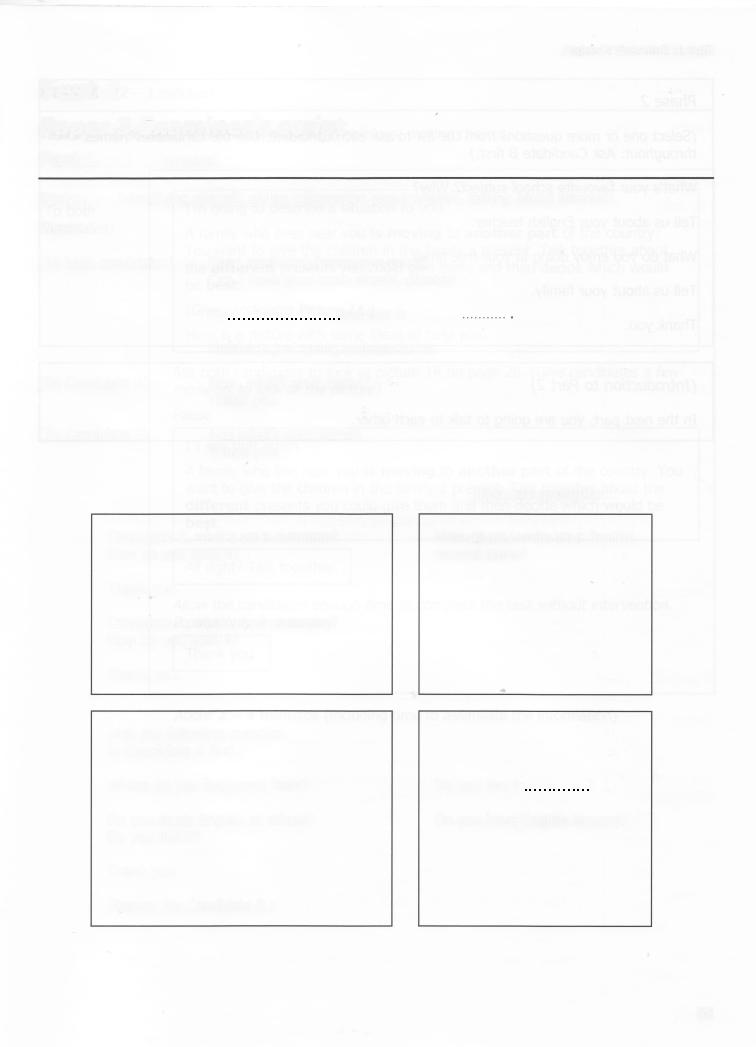
Paper 3: Examiner's script
Test 1
Paper 3 Examiner's script
P a r t i ( 2 - 3 minutes)
Tasks |
Identifying oneself; giving information about oneself, talking about interests. |
||
Phase |
1 |
|
|
(To both candidates) |
Good |
morning/afternoon/evening. |
|
|
|
Can I have your mark sheets, please? |
|
|
|
I'm |
and this is |
|
|
He/she is just going to listen to us. |
|
(To Candidate A) |
Now, what's your name? |
||
|
|
Thank you. |
|
(To Candidate B) |
And what's your name? |
||
|
|
Thank you. |
|
Back-up prompts
Candidate B, what's your surname? How do you spell it?
Thank you.
Candidate A, what's your surname? How do you spell it?
Thank you.
(Ask |
the following question |
to |
Candidate A first.) |
Where do you live/come from?
Do you study English at school? Do you like it?
Thank you.
(Repeat for Candidate B.)
How do you write your family/ second name?
Do you live in |
? |
Do you have English lessons?
65
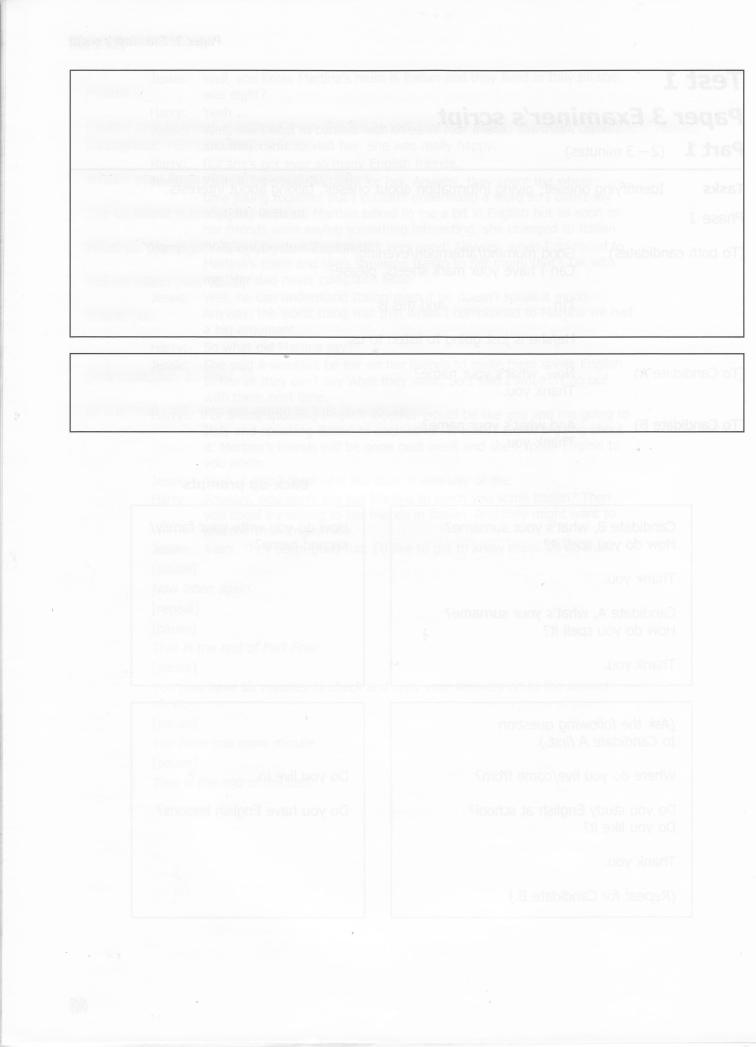
r
Test 1: Examiner's script
Phase |
2 |
|
|
|
(Select |
one |
or |
more questions |
from the list to ask each candidate. Use the candidates' names |
throughout. |
Ask |
Candidate B |
first.) |
|
What's your favourite school subject? Why?
Tell us about your English teacher.
What do you enjoy doing in your free time?
Tell us about your family.
Thank you.
(Introduction to Part 2)
In the next part, you are going to talk to each other.
66
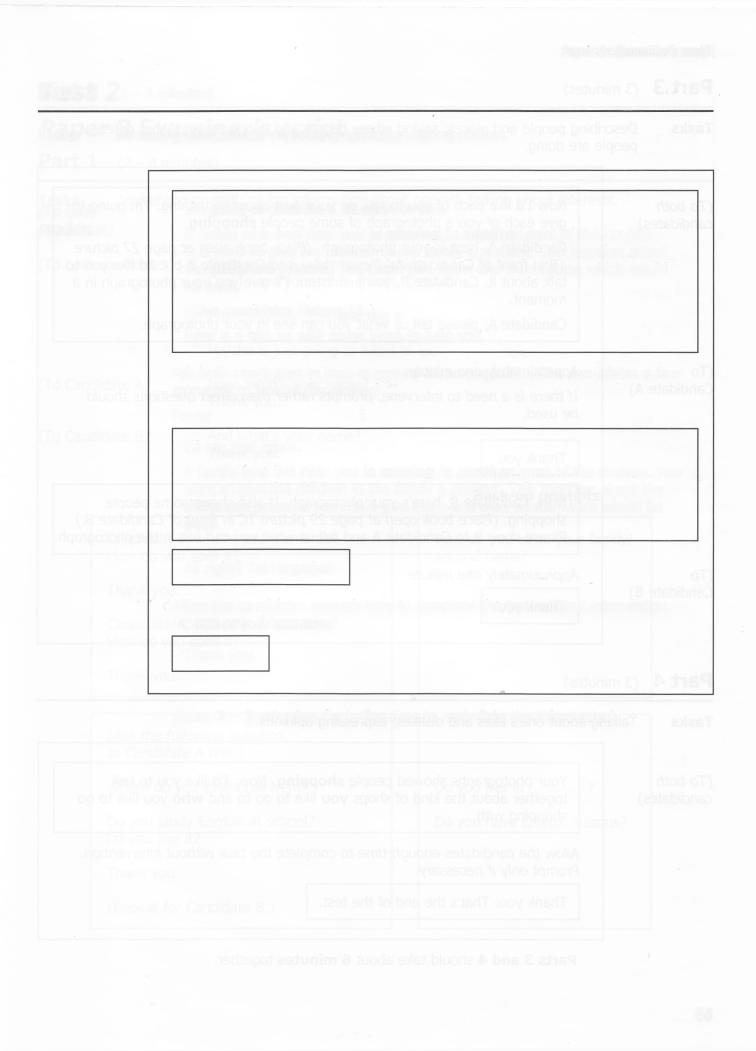
Part 2
Tasks
(To both candidates)
Paper 3: Examiner's script
( 2 - 3 minutes)
Discussing alternatives; expressing opinions; making choices.
I'm going to describe a situation to you.
A family who lives near you is moving to another part of the country. You want to give the children in the family a present. Talk together about the different presents you could give them and then decide which would be best.
(Give candidates Picture 1A.)
Here is a picture with some ideas to help you.
Ask both candidates to look at picture 1A on page 26. (Give candidates a few moments to look at the picture)
Pause
I'll say that again.
A family who live near you is moving to another part of the country. You want to give the children in the family a present. Talk together about the different presents you could give them and then decide which would be best.
All right? Talk together.
Allow |
the candidates enough time to complete the task without intervention. |
Prompt |
only if necessary. |
Thank you.
About 2 - 3 minutes (including time to assimilate the information)
67
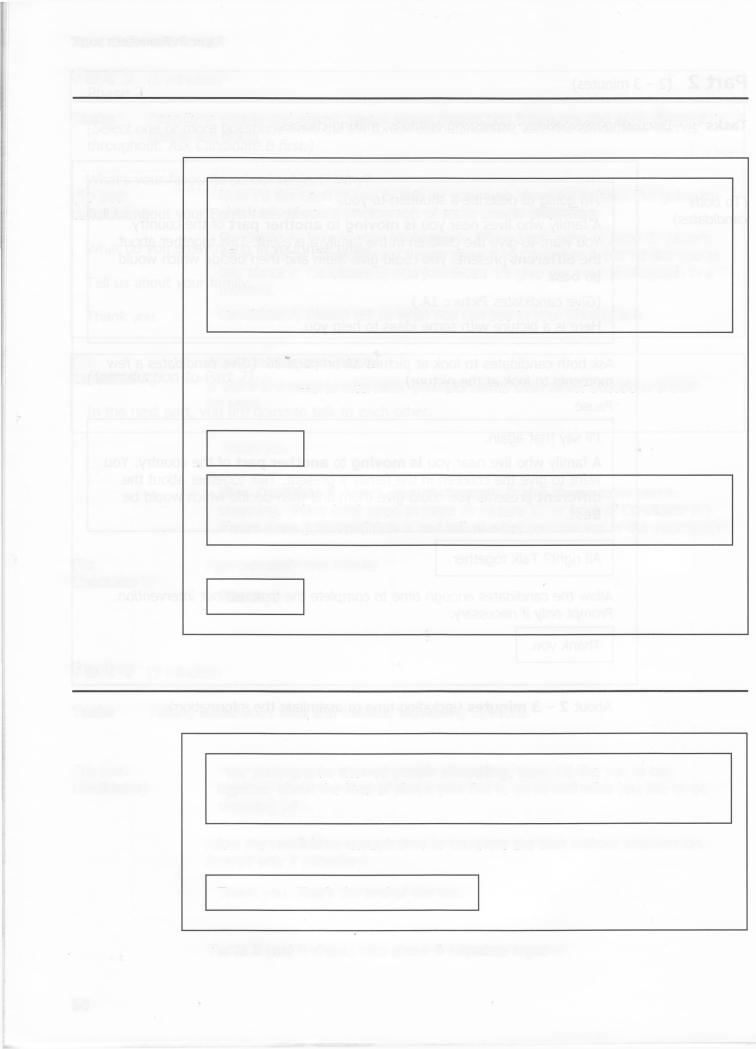
Paper 3: Examiner's script
Part 3 |
(3 minutes) |
|
Tasks |
Describing people and places; saying where people and things are and what different |
|
|
people are doing. |
|
(To both |
Now I'd like each of you to talk on your own about something. I'm going to |
|
candidates) |
give each of you a photograph of some people shopping. |
|
|
Candidate A, here is your photograph. (Place book open at page |
27 picture |
|
IB in front of Candidate A.) Please show it to Candidate B but I'd |
like you to |
|
talk about it. Candidate B, you just listen. I'll give you your photograph in a |
|
|
moment. |
|
Candidate A, please tell us what you can see in your photograph.
(To Candidate A)
(To Candidate B)
Approximately |
one |
minute |
|
If |
there is a |
need |
to intervene, prompts rather than direct questions should |
be |
used. |
|
|
Thank you.
Now, Candidate B, here's your photograph. It also shows some people shopping. (Place book open at page 29 picture 1C in front of Candidate B.)
Please show it to Candidate A and tell us what you can see in the photograph.
Approximately one minute
Thank you.
Part 4 |
(3 minutes) |
|
|
Tasks |
Talking about one's likes and dislikes; expressing opinions. |
||
(To both |
Your photographs showed people shopping. Now, I'd like you to talk |
||
candidates) |
together about the kind of shops you like to go to and who you like to go |
||
|
shopping |
with. |
|
|
Allow |
the |
candidates enough time to complete the task without intervention. |
|
Prompt |
only if necessary. |
|
Thank you. That's the end of the test.
Parts 3 and 4 should take about 6 minutes together.
68
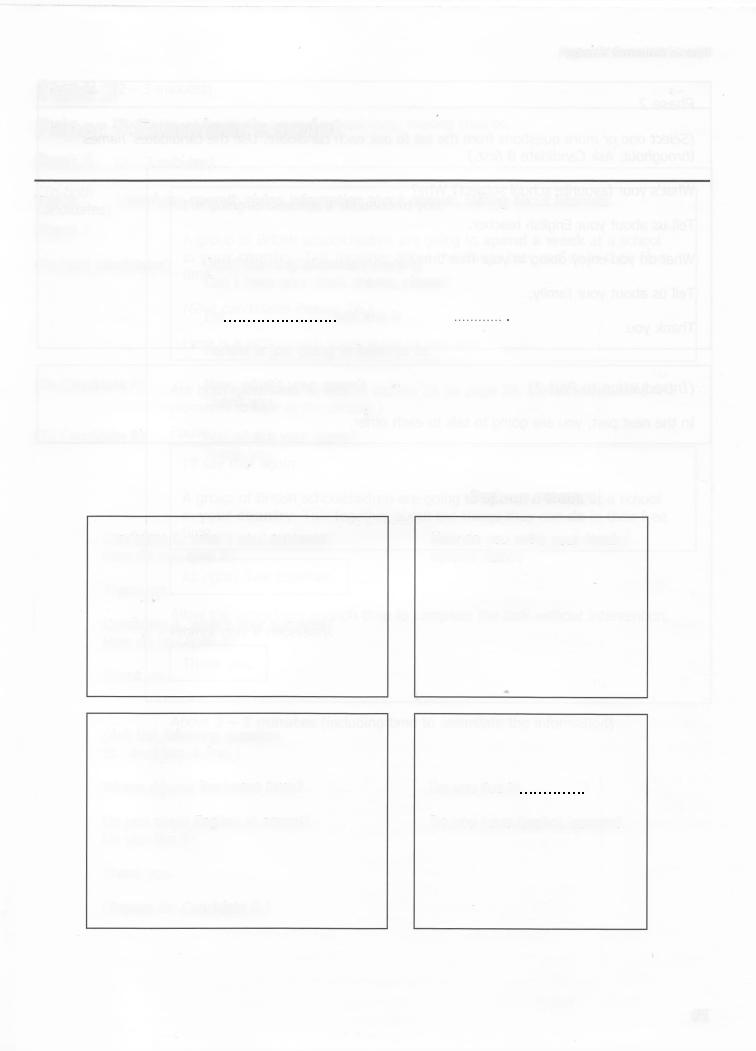
Paper 3: Examiner's script
Test 2
Paper 3 Examiner's script
Part 1 ( 2 - 3 minutes)
Tasks |
Identifying oneself; giving information about oneself, talking about interests. |
||
Phase |
1 |
|
|
(To both candidates) |
Good |
morning/afternoon/evening. |
|
|
|
Can I have your mark sheets, please? |
|
|
|
I'm |
and this is |
|
|
He/she is just going to listen to us. |
|
(To Candidate A) |
Now, what's your name? |
||
|
|
Thank you. |
|
(To Candidate B) |
And what's your name? |
||
|
|
Thank you. |
|
Back-up prompts
Candidate B, what's your surname? How do you spell it?
Thank you.
Candidate A, what's your surname? How do you spell it?
Thank you.
How do you write your family/ second name?
(Ask the following question to Candidate A first.)
Where do you live/come from?
Do you study English at school? Do you like it?
Thank you.
(Repeat for Candidate B.)
Do you live in |
? |
Do you have English lessons?
69
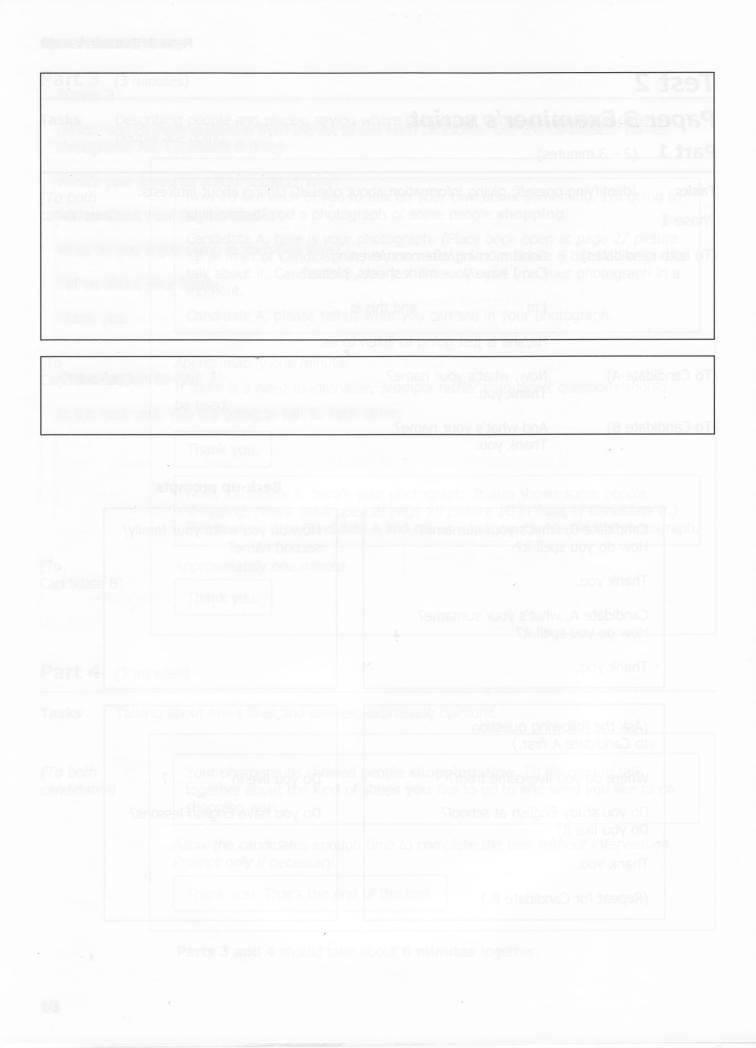
Paper 3: Examiner's script
Phase |
2 |
|
|
|
(Select |
one |
or |
more questions |
from the list to ask each candidate. Use the candidates' names |
throughout. |
Ask |
Candidate B |
first.) |
|
What's your favourite school subject? Why?
Tell us about your English teacher.
What do you enjoy doing in your free time?
Tell us about your family.
Thank you.
(Introduction to Part 2)
In the next part, you are going to talk to each other.
70
